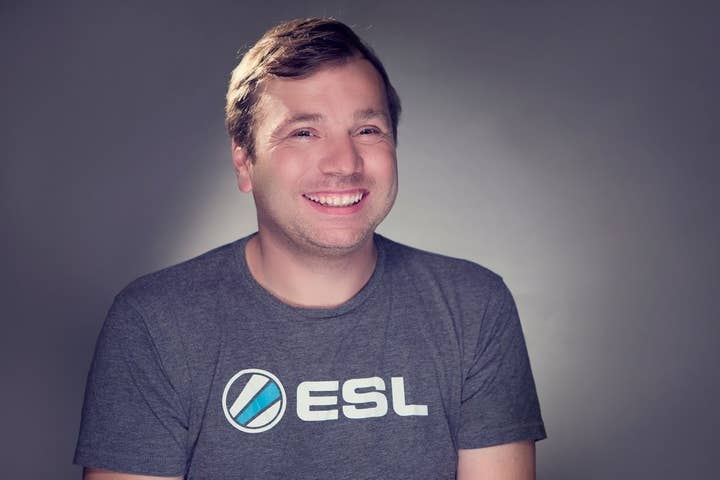eSports will be bigger than hockey - ESL CEO
Ralf Reichert projects competitive gaming as a top 5 sport worldwide, not by reaching out to new audiences but by building from its core
You can't accuse eSports League CEO Ralf Reichert of always telling people what they want to hear. At last month's FanExpo Canada in Toronto, Ontario, just a few blocks away from the Hockey Hall of Fame, Reichert told GamesIndustry.biz that he saw competitive gaming overtaking the local pastime.
"Our honest belief is it's going to be a top 5 sport in the world," Reichert said. "If you compare it to the NHL, to ice hockey, that's not a first row sport, but a very good second-row sport. [eSports] should be ahead of that... It's already huge, it's already comparable to these traditional sports. Not the Super Bowl, but the NHL [Stanley Cup Finals]."
Each game of this year's Stanley Cup Finals averaged 5 million viewers on NBC and the NBC Sports Network. The finals of the ESL Intel Extreme Masters' eighth season, held in March in Katowice, Poland, drew 1 million peak concurrent viewers, and 10 million unique viewers over the course of the weekend. That's comparing the US audience for hockey to a global audience for the IEM series, but Reichert said the events are getting larger all the time.
"If you compare it to the NHL, to ice hockey, that's not a first row sport, but a very good second-row sport. [eSports] should be ahead of that"
As for how eSports have grown in recent years, the executive characterized it as a mostly organic process, and one that sometimes happens in spite of the major players. One mistake he's seen eSports promoters make time and again is trying to be too far ahead of the curve.
"There have been numerous attempts to do celebrity leagues as a way to grow eSports, to make it more accessible," Reichert said. "And rather than focusing on the core of eSports, the Starcrafts and League of Legends of the world, people tried to use easy games, put celebrities on it, and make a classic TV format out of it."
One such effort, DirecTV's Championship Gaming Series, held an "inaugural draft" at the Playboy Mansion in Beverly Hills and featured traditional eSports staples like Counter-Strike: Source alongside arguably more accessible fare like Dead or Alive 4, FIFA 07, and Project Gotham Racing 3.
"They put in tens of millions of dollars in trying to build up a simplified eSports league, and it was just doomed because they tried to simplify it rather than embrace the beauty of the apparent complexity."
Complexity is what gives established sports their longevity, Reichert said. And while he dismisses the idea that eSports are any more complex than American football or baseball, he also acknowledged there is a learning curve involved, and it's steep enough that ESL isn't worrying about bringing new people on board.
"Our focus is more to have the generations who grew up with it as true fans, rather than trying to educate people who are outside of this conglomerate"
"It's tough for generations who didn't grow up with gaming to get what Starcraft is," Reichert said. "They need to spend 2-10 hours with it, in terms of watching it, getting it explained, and getting educated around it, or else they still might have that opinion. Our focus is more to have the generations who grew up with it as true fans, rather than trying to educate people who are outside of this conglomerate... There have been numerous attempts to make European soccer easier to approach, or American football, or baseball, but they all kill the soul of the actual sport. Every attempt to do that is just doomed."
Authenticity is what keeps the core of the audience engaged, Reichert said. And even though there will always be purists who fuss over every change--Reichert said changing competitive maps in Starcraft could spark a debate like instant replay in baseball--being true to the core of the original sport has been key for snowboarding, mixed martial arts, and every other successful upstart sport of the last 15 years.
"Like with every new sport, the biggest obstacle has been people not believing in it," Reichert said. "And it goes across media, sponsorships, game developers, press, everyone. The acceptance of eSports was a hard fought battle over a long, long time, and there's a tipping point where it goes beyond people looking at it like 'what the hell is this?' And to reach that point was the big battle for eSports... The thing is, once we started to fill these stadiums, everyone looking at the space instantly gets it. Games, stadiums, this is a sport. It's such a simple messaging that no one denies it anymore who knows about the facts."
That's not to say everybody is convinced. ESPN president John Skipper recently dismissed eSports as "not a sport," even though his network streamed coverage of Valve's signature Dota 2 tournament earlier this year. Reichert admitted that mainstream institutions seem to be lagging behind when it comes to acceptance, particularly with sponsors. While companies within the game industry are sold on eSports, non-endemic advertisers are only beginning to get it.
"The very, let's say progressive ones, like Red Bull, are already involved," Reichert said. "But to get it into the T-Mobiles and other companies as a strategy piece, that will still take some time. The market in terms of the size and quality of events is still ahead of the sponsorship, but that's very typical."
Toronto was the second stop for ESL's IEM Season 9 after launching in Shenzhen July 16. The league is placing an international emphasis on this year's competition, with additional stops planned in the US, Europe, and Southeast Asia.

